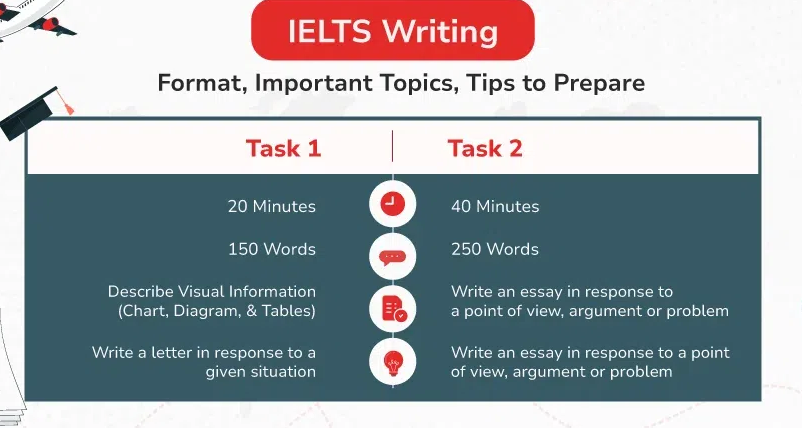Writing is one of the most challenging sections of the IELTS exam, but with the right strategies, you can significantly improve your score. Whether you are preparing for the IELTS Academic or IELTS General Training, understanding the key techniques is essential. In this guide, we will provide IELTS tips writing to help you enhance your performance and achieve your desired band score.
For free IELTS writing practice, visit CoreSkills.pk, where you can access expert feedback and over 30 mock tests to sharpen your skills.
Understanding the IELTS Writing Test
The IELTS Writing section consists of two tasks that assess your ability to write clear, well-structured, and grammatically accurate responses.
- Task 1 (Academic): You will describe a graph, chart, map, or diagram in at least 150 words.
- Task 1 (General Training): You will write a letter (formal, semi-formal, or informal) in at least 150 words.
- Task 2 (Both Academic & General): You will write an essay (argumentative, opinion-based, or problem-solution) in at least 250 words.
Since Task 2 contributes more to your writing band score, it’s important to focus on structuring your essay properly.
Top IELTS Tips Writing to Boost Your Score
1. Understand the Question Clearly
One of the most common mistakes candidates make is misinterpreting the question. Carefully read the instructions and identify:
- The main topic
- The type of response required (opinion, discussion, problem-solving, etc.)
- The key words that define what you need to write
For example, if a question asks, “Do you agree or disagree?”, you must take a clear stance and support it with reasons.
2. Structure Your Answer Properly
A well-organized response is crucial for scoring high in Coherence and Cohesion. Follow these structures:
For Task 1 (Academic & General Training)
- Introduction: Paraphrase the question and introduce the main idea.
- Body Paragraphs: Explain the data (Academic) or expand on the main points (General Training).
- Conclusion: Summarize key points concisely.
For Task 2 (Essay Writing)
A well-structured essay should have:
- Introduction:
- Paraphrase the topic.
- Clearly state your opinion (if required).
- Mention the points you will discuss.
- Body Paragraph 1:
- Introduce the first main idea.
- Provide supporting evidence/examples.
- Body Paragraph 2:
- Present the second argument.
- Give explanations/examples.
- Conclusion:
- Summarize your main points.
- Restate your opinion (if applicable).
Using this structure ensures that your ideas are logically organized.
3. Use a Wide Range of Vocabulary
The Lexical Resource criterion in IELTS assesses your ability to use varied and appropriate vocabulary. Here’s how to improve:
✅ Avoid Repetition – Use synonyms instead of repeating words.
✅ Use Advanced Vocabulary – Try words like substantial instead of big or beneficial instead of good.
✅ Use Collocations – Common word pairings like make a decision, reach a conclusion, or pose a challenge make writing more natural.
💡 Pro Tip: Practice with IELTS sample essays on CoreSkills.pk to expand your vocabulary.
4. Improve Grammar and Sentence Structure
Grammar plays a major role in your writing score. To enhance your Grammatical Range and Accuracy, focus on:
✔ Complex Sentences – Instead of writing short, simple sentences, try using linking words like although, however, and despite.
✔ Passive Voice – In Academic Writing Task 1, use passive structures like “The data was collected from…”
✔ Articles & Prepositions – Many candidates make mistakes with a/an/the or in/on/at.
📌 Example of a Good Sentence:
“Although online education is becoming popular, traditional classroom learning still plays a vital role in student development.”
5. Manage Your Time Effectively
You have only 60 minutes for the writing test. Here’s how to divide your time:
⏳ Task 1: Spend 20 minutes (150 words)
⏳ Task 2: Spend 40 minutes (250 words)
Time Management Strategy:
- 5 minutes: Plan your answer (brainstorm ideas & structure).
- 30 minutes: Write the response.
- 5 minutes: Proofread for grammar and spelling mistakes.
Since Task 2 has more weight in scoring, never skip it even if Task 1 takes longer.
6. Use Linking Words for Coherence
To make your writing flow smoothly, use transition words like:
For Adding Ideas: Furthermore, Moreover, In addition
For Contrast: However, Although, On the other hand
For Giving Examples: For instance, Such as, Namely
For Conclusions: In summary, To conclude, All in all
Using these linking words correctly will improve your Coherence & Cohesion score.
7. Avoid Common Mistakes
🚫 Not meeting word count – Write at least 150 words for Task 1 and 250 words for Task 2.
🚫 Writing informally – Use formal academic language, especially in Task 2 essays.
🚫 Not proofreading – Always check for errors in spelling, punctuation, and grammar.
Where to Practice IELTS Writing for Free?
Practicing regularly is the best way to improve. One of the best platforms for free IELTS writing practice is CoreSkills.pk. Here’s why:
⭐ 30+ Free IELTS Mock Tests for Writing, Reading, Listening, and Speaking.
⭐ Instant Evaluation to understand mistakes and improve.
⭐ Model Answers to learn from high-scoring responses.
⭐ Expert Tips to help you enhance your IELTS writing skills.
If you’re serious about achieving a high band score, visit CoreSkills.pk today!
Final Thoughts
Scoring high in IELTS writing requires practice, strategy, and consistency. By following these IELTS tips writing, you can develop strong writing skills and confidently take the test.
✅ Understand the question properly
✅ Structure your answer logically
✅ Use a wide range of vocabulary and grammar
✅ Manage time efficiently
✅ Practice consistently on CoreSkills.pk
Start practicing now and boost your IELTS writing score! 🚀
💡 For free mock tests and expert IELTS preparation, visit CoreSkills.pk!


